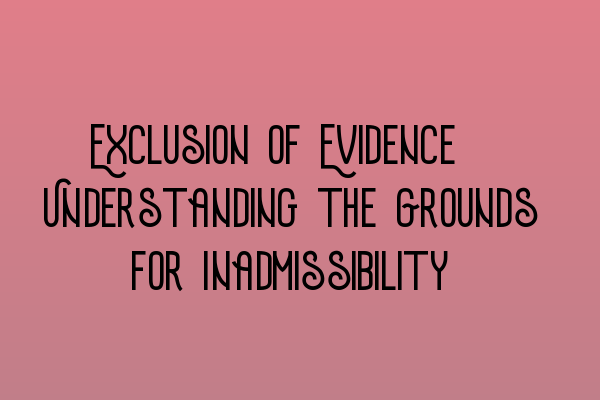As criminal defense solicitors at SQE Criminal Law & Practice Law UK, we often come across cases where the exclusion of evidence becomes crucial to secure a just outcome for our clients. Understanding the grounds for inadmissibility is essential for any legal professional involved in criminal law. In this article, we will explore the concept of exclusion of evidence, its importance, and the key grounds on which evidence can be deemed inadmissible in court.
The exclusion of evidence plays a crucial role in ensuring fairness and justice in criminal proceedings. It prevents unlawfully obtained or unreliable evidence from being used to convict individuals. As solicitors, we strive to protect the rights of our clients by advocating for the exclusion of evidence that does not meet the required legal standards.
There are various grounds on which evidence may be deemed inadmissible in court. These include:
1. Illegally Obtained Evidence: Evidence obtained through unlawful means, such as unauthorized searches or seizures, cannot be admitted in court. This is in line with the principles of fairness and the protection of individuals’ privacy rights.
2. Unreliable Evidence: Evidence that is deemed unreliable or lacking credibility may be excluded. This can include hearsay evidence, evidence obtained through torture or duress, or evidence tainted by misconduct.
3. Privileged Communications: Certain communications, such as those between a solicitor and client or doctor and patient, are protected by privilege. These privileged communications are generally not admissible as evidence in court.
4. Improperly Obtained Confessions: Confessions or statements obtained through coercion, deception, or in violation of the suspect’s rights may be excluded. It is essential to ensure that suspects are afforded their legal rights during the interrogation process.
5. Opinions or Speculations: Opinions or speculative evidence that does not offer a factual basis may be excluded. The court relies on objective evidence to arrive at a fair judgment.
These grounds for inadmissibility are designed to protect individuals’ rights, promote fairness, and maintain the integrity of the justice system.
In criminal proceedings, the exclusion of evidence is a fundamental aspect of ensuring a fair trial. As solicitors specializing in criminal law at SQE Criminal Law & Practice Law UK, we understand the importance of advocating for the exclusion of evidence that does not meet the required legal standards. By familiarizing ourselves with the grounds for inadmissibility, we can effectively protect the rights of our clients and contribute to a just and equitable criminal justice system.
- SQE 1 Practice Exam Questions
- SQE 1 Practice Mocks FLK1 FLK2
- SQE 2 Preparation Courses
- SQE 1 Preparation Courses
- SRA SQE Exam Dates
